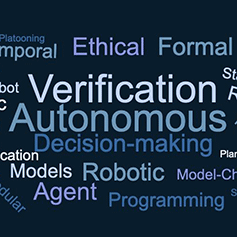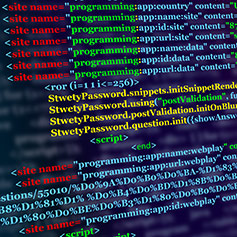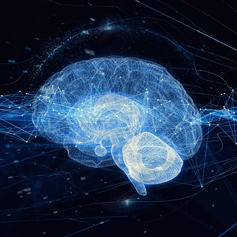
Artificial Intelligence
Intelligent systems are part of the foundations for the next major industrial revolution.
Our facilities
We boast an incredible array of facilities, making our innovative artificial intelligence research possible.
Our research sits at the forefront of fundamental research and seeks answers to questions that could revolutionise AI. From the theory and practice of machine learning, including deep neural network architectures, causality, and knowledge representations, through to robot-human interaction and language learning. We are forging a path toward seamless integration of intelligent systems into our natural environment.
Areas of expertise
Our researchers focus their work in the following specialist areas:
-
Autonomy and verification
We focus on autonomous systems and their development, verification, and analysis, Applications include robots, self-driving vehicles, distributed sensor-rich systems and decision-making software.
Read more
-
Formal methods
We provide formal mathematical foundations for Computer Science, from verification of hardware, software and agent systems to cryptography and knowledge representation, reasoning and knowledge management.
Read more
-
Machine learning and robotics
We develop and apply novel statistical Machine Learning methodologies, from theory to application, and push forward the state of the art in Human-Robot interactions with our Cognitive Robotics Lab.
Read more
-
Natural language processing and text mining
We develop NLP and text mining techniques to provide insights for social scientists, biologists, and neuroscientists. Our strong interdisciplinary foundations support a world leading expertise in information extraction.
Read more
-
Systems and software security
We develop state-of-the-art algorithms, methods and protocols to address security and privacy in networked and distributed system environments, and tools to build verifiable, trustworthy software systems.
Read more
Postgraduate research projects
Artificial intelligence projects
- (MRC DTP) Unlocking the research potential of unstructured patient data to improve health and treatment outcomes
- Abstractive multi-document summarisation
- Applying Natural Language Processing to real-world patient data to optimise cancer care
- Automated Repair of Deep Neural Networks
- Automatic Activity Analysis, Detection and Recognition
- Automatic Emotion Detection, Analysis and Recognition
- Automatic Experimental Design with Human in the Loop (2025 entry onward)
- Automatic Learning of Latent Force Models
- Balancing security and privacy with data usefulness and efficiency in wireless sensor networks
- Biologically-Plausible Continual Learning
- Cognitive Robotics and Human Robot Interaction
- Collaborative Probabilistic Machine Learning (2025 entry onward)
- Computational Modelling of Child Language Learning
- Contextualised Multimedia Information Retrieval via Representation Learning
- Controlled Synthesis of Virtual Patient Populations with Multimodal Representation Learning
- Data Integration & Exploration on Data Lakes
- Data Lake Exploration with Modern Artificial Intelligence Techniques
- Data-Science Approaches to Better Understand Multimorbidity and Treatment Outcomes in Patients with Rheumatoid Arthritis
- Deep Learning for Temporal Information Processing
- Design and Implementation of an FPGA-Accelerated Data Analytics Database
- Designing Safe & Explainable Neural Models in NLP
- Diabetes Tamagotchi's for Training Clinical Endocrinologists and Diabetologists
- Ensemble Strategies for Semi-Supervised, Unsupervised and Transfer Learning
- Event Coreference at Document Level
- Explainable and Interpretable Machine Learning
- Exploring the use of LLMs for Code Generation in Test-Only Development
- Extending Behavioural Algorithmics as a Predictor of Type 1 Diabetes Blood Glucose Highs
- Formal Verification for Robot Swams and Wireless Sensor Networks
- Formal Verification of Robot Teams or Human Robot Interaction
- Foundations and Advancement of Subontology Generation for Clinically Relevant Information
- Generating Goals from Responsibilities for Long Term Autonomy
- Generating explainable answers to fact verification questions
- Generative AI for Video Games
- Generative Artificial Intelligence as a Personalised and Adaptive Bolus Advisor
- Hardware Aware Training for AI Systems
- How can AI support interaction with complex systems?
- Hybrid Fuzzing Concurrent Software using Model Checking and Machine Learning
- Integrated text and table mining
- Job and Task Scheduling and Resource Allocation on Parallel/Distributed systems including Cloud, Edge, Fog Computing
- Knowledge Graph for Guidance and Explainability in Machine Learning
- Learning of user models in human-in-the-loop machine learning (2025 entry onward)
- Machine Learning and Cognitive Modelling Applied to Video Games
- Machine Learning for Vision and Language Understanding
- Models of Bio-Sensed Body Temperature and Environment as a Refinement of Type 1 Diabetes Blood Glucose Prediction Algorithmics
- Multi-task Learning and Applications
- Music Generation and Information Processing via Deep Learning
- Neuro-sybolic theorem proving
- Ontology Informed Machine Learning for Computer Vision
- Optimization and verification of systems modelled using neural networks
- Probabilistic modelling and Bayesian machine learning (2025 entry onward)
- Problems in large graphs representing social networks
- Programmable Mixed-Signal Fabric for Machine Learning Applications
- Representation Learning and Its Applications
- Retrieved Augmented Generation with Data Lakes and Knowledge Graphs
- Skyrmion-based Electronics
- Skyrmionic Devices for Neuromorphic Computing
- Smart Security for Smart Services in an IoT Context
- Software verification with contrained Horn clauses and first-order theorem provers
- Solving PDEs via Deep Neural Nets: Underpinning Accelerated Cardiovascular Flow Modelling with Learning Theory
- Solving mathematical problems using automated theorem provers
- Solving non-linear constraints over continuous functions
- Symmetries and Automated Theorem Proving
- Text Analytics and Blog/Forum Analysis
- Theorem Proving for Temporal Logics
- Trustworthy Multi-source Learning (2025 entry onward)
- Verification Based Model Extraction Attack and Defence for Deep Neural Networks
- Zero-Shot Learning and Applications
Sophia Ananiadou projects
Mauricio Alvarez projects
Richard Banach projects
Riza Batista-navarro projects
Ke Chen projects
- Automatic Activity Analysis, Detection and Recognition
- Automatic Emotion Detection, Analysis and Recognition
- Biologically-Plausible Continual Learning
- Contextualised Multimedia Information Retrieval via Representation Learning
- Deep Learning for Temporal Information Processing
- Ensemble Strategies for Semi-Supervised, Unsupervised and Transfer Learning
- Explainable and Interpretable Machine Learning
- Generative AI for Video Games
- Machine Learning and Cognitive Modelling Applied to Video Games
- Multi-task Learning and Applications
- Music Generation and Information Processing via Deep Learning
- Zero-Shot Learning and Applications
Emily Collins projects
Angelo Cangelosi projects
Jiaoyan Chen projects
Lucas Cordeiro projects
- Application Level Verification of Solidity Smart Contracts
- Automated Repair of Deep Neural Networks
- Automatic Detection and Repair of Software Vulnerabilities in Unmanned Aerial Vehicles
- Combining Concolic Testing with Machine Learning to Find Software Vulnerabilities in the Internet of Things
- Designing Safe & Explainable Neural Models in NLP
- Exploiting Software Vulnerabilities at Large Scale
- Finding Vulnerabilities in IoT Software using Fuzzing, Symbolic Execution and Abstract Interpretation
- Hybrid Fuzzing Concurrent Software using Model Checking and Machine Learning
- Using Program Synthesis for Program Repair in IoT Security
- Verification Based Model Extraction Attack and Defence for Deep Neural Networks
- Verifying Cyber-attacks in CUDA Deep Neural Networks for Self-Driving Cars
Louise Dennis projects
Clare Dixon projects
Suzanne Embury projects
Marie Farrell projects
Alejandro Frangi projects
Andre Freitas projects
Michael Fisher projects
Simon Harper projects
- Diabetes Tamagotchi's for Training Clinical Endocrinologists and Diabetologists
- Extending Behavioural Algorithmics as a Predictor of Type 1 Diabetes Blood Glucose Highs
- Generative Artificial Intelligence as a Personalised and Adaptive Bolus Advisor
- Models of Bio-Sensed Body Temperature and Environment as a Refinement of Type 1 Diabetes Blood Glucose Prediction Algorithmics
Caroline Jay projects
Samuel Kaski projects
- Automatic Experimental Design with Human in the Loop (2025 entry onward)
- Collaborative Probabilistic Machine Learning (2025 entry onward)
- Learning of user models in human-in-the-loop machine learning (2025 entry onward)
- Probabilistic modelling and Bayesian machine learning (2025 entry onward)
- Trustworthy Multi-source Learning (2025 entry onward)
Dirk Koch projects
Konstantin Korovin projects
- Neuro-sybolic theorem proving
- Optimization and verification of systems modelled using neural networks
- Software verification with contrained Horn clauses and first-order theorem provers
- Solving mathematical problems using automated theorem provers
- Solving non-linear constraints over continuous functions
- Symmetries and Automated Theorem Proving
Christoforos Moutafis projects
Tingting Mu projects
Anirbit Mukherjee projects
Goran Nenadic projects
- (MRC DTP) Unlocking the research potential of unstructured patient data to improve health and treatment outcomes
- Applying Natural Language Processing to real-world patient data to optimise cancer care
- Data-Science Approaches to Better Understand Multimorbidity and Treatment Outcomes in Patients with Rheumatoid Arthritis
- Integrated text and table mining
- Text Analytics and Blog/Forum Analysis
Paul Nutter projects
- A New Generation of Terahertz Emitters: Exploiting Electron Spin
- Effective Teaching of Programming: A Detailed Investigation
- Extending Behavioural Algorithmics as a Predictor of Type 1 Diabetes Blood Glucose Highs
- Models of Bio-Sensed Body Temperature and Environment as a Refinement of Type 1 Diabetes Blood Glucose Prediction Algorithmics
- Skyrmionic Devices for Neuromorphic Computing
Nhung Nguyen projects
Norman Paton projects
Vasilis Pavlidis projects
Pavlos Petoumenos projects
Oliver Rhodes projects
Rizos Sakellariou projects
- Dynamic Resource Management for Intelligent Transportation System Applications
- Finding a way through the Fog from the Edge to the Cloud
- Job and Task Scheduling and Resource Allocation on Parallel/Distributed systems including Cloud, Edge, Fog Computing
- Managing the data deluge for Big Data, Internet-of-Things and/or Industry 4.0 environments
- Problems in large graphs representing social networks
- Scheduling, Resource Management and Decision Making for Cloud / Fog / Edge Computing






